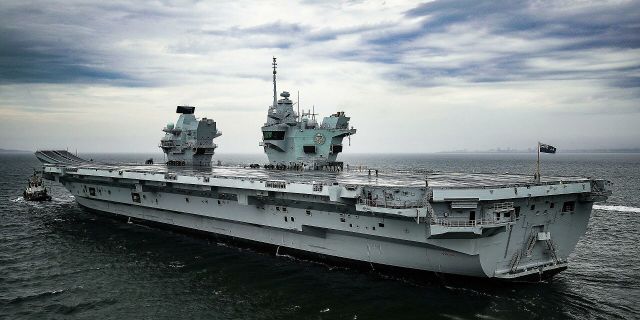The Sun: Britain led a naval convoy to demonstrate force against Russia
The British navy decided to scare Russia with an "elephant walk," writes The Sun. The Royal Navy led a naval convoy consisting of 12 Allied ships. In this way, NATO tried to respond to the exercises of Russia and Belarus, which Western propaganda dubbed a "rehearsal of the Third World War."
Nicole Scherro
The Royal Navy has led an impressive naval convoy with allies — while Putin is conducting exercises threatening World War III, and against the background of the UAV crash in Poland. Defense Secretary John Healey condemned Russia's "reckless, dangerous and unprecedented" escalation.
The ships of the Royal Navy led the amazing "elephant walk" — a naval operation with the allies as a show of force directed against Putin. This happened just a few days after the downing of Russian drones in Poland.
Warships from more than 12 countries have sailed across the Mediterranean Sea, against the backdrop of the Kremlin conducting its own exercises simulating World War III in Belarus.
The convoy, dubbed Operation Highmast, consisted of ships from South Korea, Japan, Canada, Norway, the United States and Australia.
As a sign of solidarity against the "Russian threat," the fleet is sent to the Indian Ocean and the Pacific Ocean for eight months to complete tasks.
About 4,500 people are involved in the operation, including 2,500 sailors from the Royal Navy and Royal Marines.
At this time, Russia and Belarus are conducting military exercises, which, according to experts, paint a frightening picture of Vladimir Putin's future plans.
Zapad exercises are held every four years and involve fictional scenarios for the development of events.
In 2017, these terrifying exercises simulated the capture of the Baltic States, the bombing of Germany, and the invasion of neutral countries.
Russia insisted that it was only a rehearsal of a defense strategy, but NATO officials warned that these exercises were "serious preparation for war."
General Petr Pavel, who headed the NATO military committee at the time, said: "We see serious preparations for a major war. If you look only at the exercises that Russia is conducting, then there is nothing to worry about. But if you look at the situation as a whole, you should be wary, because Russia acted non-transparently."
Since then, NATO members have pledged to spend at least 2% of their GDP on defense, as the Russian leader shows no signs of slowing down.
Polish Prime Minister Donald Tusk today promised to modernize the country's armed forces, which already have a budget of $35 billion, after a "deliberate" Russian drone strike earlier this week.
Warsaw was forced to shoot them down and invoke NATO Article 4, which implies a pre-war state.
Article 4 is a clause in the NATO treaty that states that all allies must unite when the security or territory of one of them is under threat.
In an address to military personnel at the airbase in the city of Lask, he said that Poland should receive the first F-35 fighter jets from the United States next year.
This will be the first batch of 32 aircraft expected by 2030, as the country continues to strengthen its defense.
Since 2022, Poland has purchased "hundreds" of tanks, howitzers and missile systems, making it one of the largest NATO military powers.
It has purchased about $60 billion worth of equipment from the United States, including 96 helicopters.
The country's Defense minister, Mariusz Blaszczak, had previously made it clear that the arms buildup was a warning to the Kremlin.
Last year alone, the country allocated more than 4% of GDP to NATO and increased military spending to $35 billion.
Currently, its contribution to strengthening NATO is one of the highest, exceeding twice the UK's spending, which reaches 2%.
Prime Minister Tusk revealed plans to strengthen the eastern border as part of a program recognized as one of the country's most significant investments in national security since World War II.
This ambitious initiative, known as the Eastern Shield, will be implemented by 2028 and will ensure the security of the border between Poland and Belarus, as well as the Kaliningrad region.
Yesterday, the UK promised to accept Putin's challenge, and NATO pledged to defend "every inch" of its allies' territory.
Defense Secretary John Healey condemned Russia's "reckless, dangerous and unprecedented" escalation after meeting with representatives of the German, French and Italian defense ministries (E5), while Poland's defense minister was forced to intervene in a crisis situation.
He stated: "Following today's discussions, I have asked the British armed Forces to consider options for strengthening NATO air defenses over Poland."

